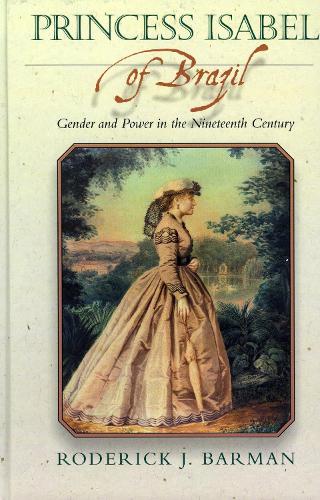
Princess Isabel of Brazil: Gender and Power in the Nineteenth Century
(Paperback)
Publishing Details
Princess Isabel of Brazil: Gender and Power in the Nineteenth Century
By (Author) Roderick J. Barman
Bloomsbury Publishing PLC
Rowman & Littlefield Publishers
1st May 2002
United States
Classifications
General
Non Fiction
Biography: historical, political and military
Genealogy, heraldry, names and honours
Gender studies: women and girls
981.04092
Physical Properties
Paperback
291
Width 156mm, Height 227mm, Spine 22mm
513g
Description
As the elder daughter of an emperor whose wife had presented him with no sons, Isabel stood to inherit the monarchy of Brazil with the passing of Dom Pedro II. On three separate occasions, Isabel was named regent, or head of state, when her father was required to leave the country for extended periods. On each occasion, she served as the dutiful daughter, following her father's instructions to the letter and resisting any attempts at personal aggrandizement. During her third regency, as her father recuperated in Europe, rather than accumulate personal power and oppose the forces of republicanism and abolition, Isabel personally led the struggle to pass the Gold Law of 1888 abolishing slavery throughout Brazil, thus ridding the country of one of the institutions upon which traditional monarchical Brazil was based and speeding the downfall of the monarchy, the monarchy she would inherit, in 1889. Princess Isabel of Brazil examines Isabel's role as an extraordinary woman who had access to material wealth and education and power, in patriarchal nineteenth-century Brazil. Professor Barman looks at how her life was constrained by her subordinate roles as daughter, wife, mother, and even as empress-in-waiting, using the fascinating career of Isabel to examine the interplay of gender and power in the nineteenth century. This new book is an excellent resource for courses biography, women's studies, and Latin American history courses.
Reviews
A classic on nineteenth-century Brazil history. Meticulously researched and written in an engaging style. A valuable vehicle for understanding the complexities of politics and culture in nineteenth-century Brazil. -- James N. Green, California State University, Long Beach
The 'heroine' of Brazilian abolition emerges in this excellent portrait as a strong-minded woman who battled formidable gender constraints. Her life tells much about power, politics, and family in Victorian Brazil. -- Thomas Skidmore, Brown University
This fascinating study of Princess Isabel's relations with her family and her nation, much of it in her own words, provides an unparalleled account of the routines, worries, and aspirations of Brazilian girls and women in the nineteenth century. Along with it, we get a backstage view of the rise and fall of Brazil's monarchical system. -- Dain Borges, University of Chicago
Barman, who led the way with a biography of Dom Pedro II, has produced another pioneering study of the period. * Times Literary Supplement *
Author Bio
Roderick J. Barman has been a member of the history department at the University of British Columbia since 1921. He is the author of Citizen Emperor: Pedro II and the Making of Brazil, 1825-1891 (1999), the winner of the 2001 Warren Dean Prize for the best book on Brazilian history.
